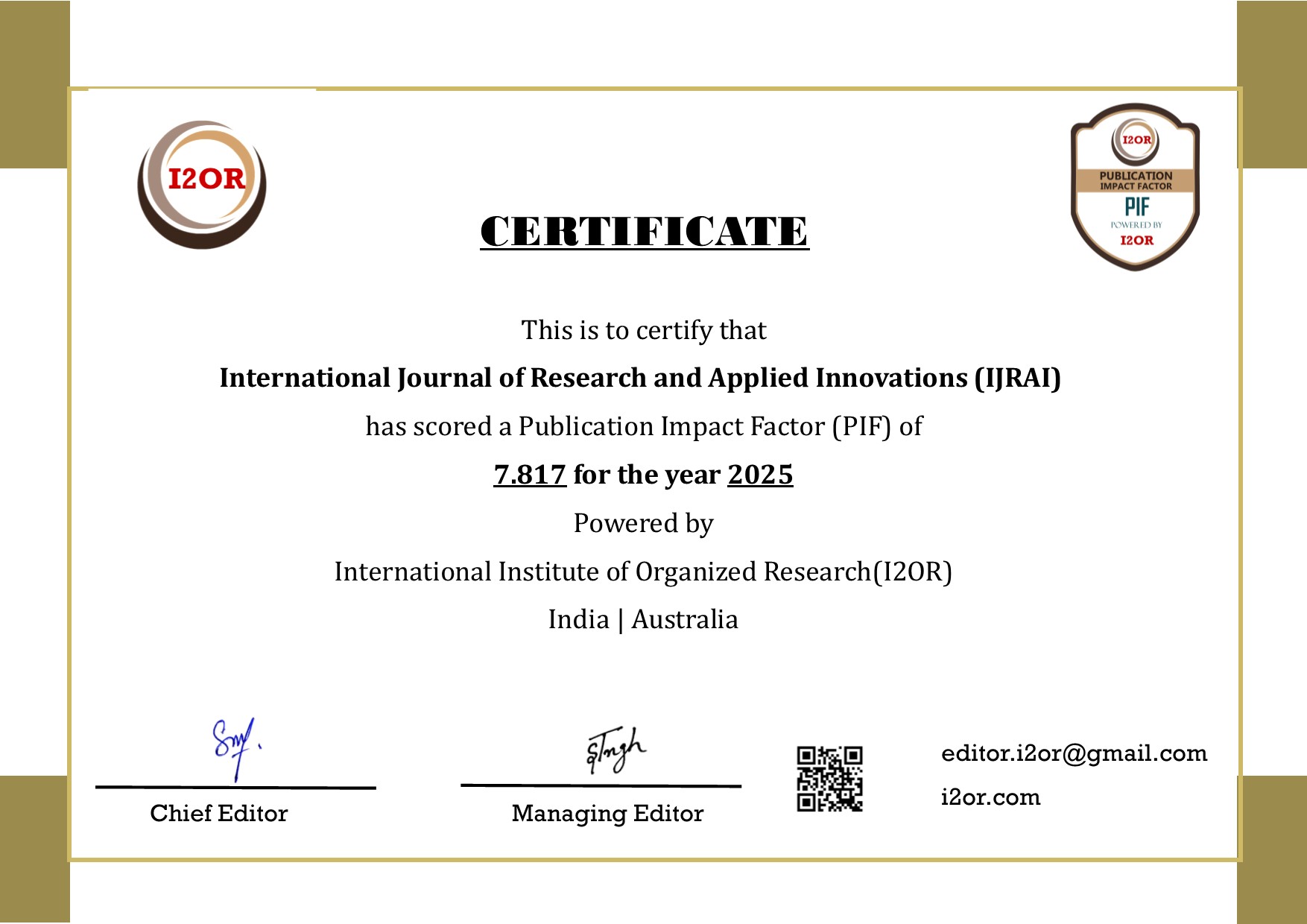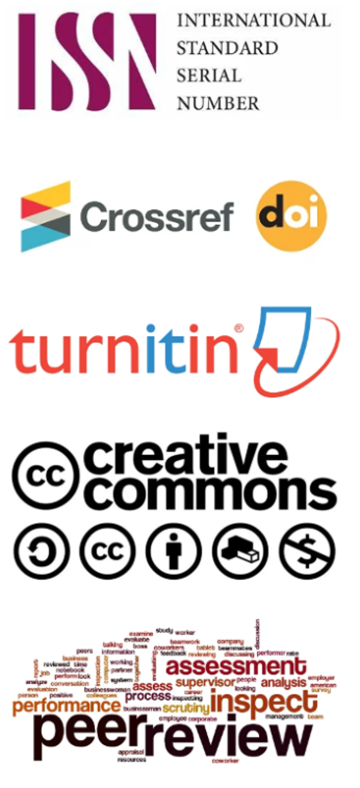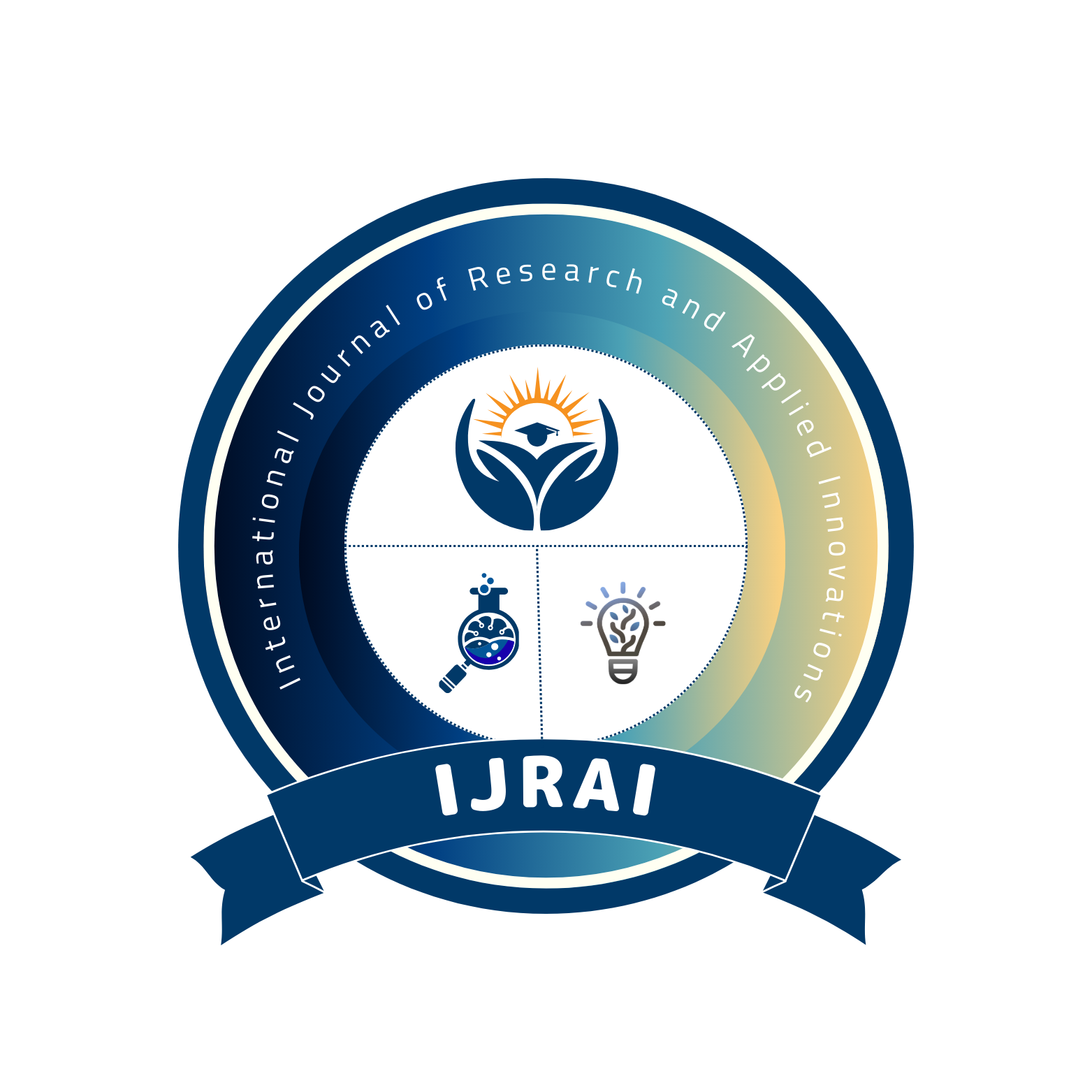AI Security in the Age of Autonomous Systems: Safeguarding Decision-Making Processes
DOI:
https://doi.org/10.15662/IJRAI.2025.0805008Keywords:
AI security, autonomous systems, data poisoning, adversarial attacks, algorithm manipulation, self-driving cars, drones, machine learning, security frameworks, threat mitigationAbstract
Since autonomous systems are increasingly being embedded in everyday life, the most important thing is to secure them. This paper explores the security systems needed to protect the decision-making of AI-powered technologies like self-driving vehicles or drones. The key issues to address are identifying and improving major security concerns, such as data poisoning, adversarial attacks, and algorithm manipulation, which undermine the integrity and reliability of such systems. This study, through a detailed examination of the current security systems, highlights the weaknesses of the autonomous systems. Case studies will be used to test the influence of these security threats, and the actual incidents will be analyzed in detail. These findings imply an immediate need for powerful, adaptive security capabilities to curb these risks and enhance the general safety of autonomous operations. The paper ends with suggestions on how AI security can be enhanced, both to develop new technology and to regulate access to such systems to mitigate the changing threat.
References
1. Azmi, S. K. (2021). Computational Yoshino-Ori Folding for Secure Code Isolation in Serverless It Architectures. Well Testing Journal, 30(2), 81-95.
2. Azmi, S. K. (2021). Riemannian Flow Analysis for Secure Software Dependency Resolution in Microservices Architectures. Well Testing Journal, 30(2), 66-80.
3. Azmi, S. K. (2021). Riemannian flow analysis for secure software dependency resolution in microservices architectures. Well Testing Journal, 30(2), 66–80.
4. Azmi, S. K. (2021, October 28). Computational Yoshino-Ori folding for secure code isolation in serverless IT architectures. Well Testing Journal, 30(2), 81–95.
5. Azmi, S. K. (2021, September). Markov Decision Processes with Formal Verification: Mathematical Guarantees for Safe Reinforcement Learning. IRE Journals, 5(3) https://www.irejournals.com/formatedpaper/1711043.pdf
6. Azmi, S. K. (2022). From Assistants to Agents: Evaluating Autonomous LLM Agents in Real-World DevOps Pipeline. Well Testing Journal, 31(2), 118-133.
7. Azmi, S. K. (2022). From assistants to agents: Evaluating autonomous LLM agents in real-world DevOps pipeline. Well Testing Journal, 31(2), 118–133.
8. Azmi, S. K. (2022). Green CI/CD: Carbon-Aware Build & Test Scheduling for Large Monorepos. Well Testing Journal, 31(1), 199-213.
9. Azmi, S. K. (2022). Green CI/CD: Carbon-aware build & test scheduling for large monorepos. Well Testing Journal, 31(1), 199–213.
10. Azmi, S. K. (2022, April). Bayesian nonparametrics in computer science: Scalable inference for dynamic, unbounded, and streaming data. IRE Journals. https://www.irejournals.com/formatedpaper/1711044.pdf
11. Azmi, S. K. (2022, March 30). Computational knot theory for deadlock-free process scheduling in distributed IT systems. Well Testing Journal, 31(1), 224–239.
12. Azmi, S. K. (2023). Algebraic geometry in cryptography: Secure post-quantum schemes using isogenies and elliptic curves. IJSRA. https://ijsra.net/sites/default/files/IJSRA-2023-0965.pdf
13. Azmi, S. K. (2023). Photonic Reservior Computing or Real-Time Malware Detection in Encrypted Network Traffic. Well Testing Journal, 32(2), 207-223.
14. Azmi, S. K. (2023). Trust but Verify: Benchmarks for Hallucination, Vulnerability, and Style Drift in AI-Generated Code Reviews. Well Testing Journal, 32(1), 76-90.
15. Azmi, S. K. (2023, August 31). Photonic reservoir computing or real-time malware detection in encrypted network traffic. Well Testing Journal, 32(2), 207–223.
16. Azmi, S. K. (2023, February 6). Trust but verify: Benchmarks for hallucination, vulnerability, and style drift in AI-generated code reviews. Well Testing Journal, 32(1), 76–90.
17. Azmi, S. K. (2024). Cryptographic hashing beyond SHA: Designing collision-resistant, quantum-resilient hash functions. International Journal of Science and Research Archive, 12(2), 3119–3127.
18. Azmi, S. K. (2024, March). Quantum Zeno effect for secure randomization in software cryptographic primitives. IRE Journals. Retrieved from https://www.irejournals.com/paper-details/1711015
19. Azmi, S. K. (2024, October). Klein bottle-inspired network segmentation for untraceable data flows in secure IT systems. IRE Journals. https://www.irejournals.com/formatedpaper/1711014.pdf
20. Azmi, S. K. (2025). Bott-Cher Cohomology for Modeling Secure Software Update Cascades in IoT Networks. International Journal of Creative Research Thoughts (IJCRT), 13(9)
21. Azmi, S. K. (2025). Enhancing Java Virtual Machine Performance for Scalable Artificial Intelligence and Machine Learning Workloads. Well Testing Journal, 34(S3), 566-580.
22. Azmi, S. K. (2025). Enhancing Java Virtual Machine performance for scalable artificial intelligence and machine learning workloads. Well Testing Journal, 34(S3), 566–580.0
23. Azmi, S. K. (2025). Kirigami-Inspired Data Sharding for Secure Distributed Data Processing in Cloud Environments. JETIR, 12(4).
24. Azmi, S. K. (2025). LLM-Aware Static Analysis: Adapting Program Analysis to Mixed Human/AI Codebases at Scale. Global Journal of Engineering and Technology Advances, 24(03), 260-269.
25. Azmi, S. K. (2025). LLM-aware static analysis: Adapting program analysis to mixed human/AI codebases at scale. Global Journal of Engineering and Technology Advances, 24(3), 260–269.
26. Azmi, S. K. (2025). Voronoi partitioning for secure zone isolation in software-defined cyber perimeters. Global Journal of Engineering and Technology Advances, 24(03), 431-441.
27. Azmi, S. K. (2025). Voronoi partitioning for secure zone isolation in software-defined cyber perimeters. Global Journal of Engineering and Technology Advances, 24(3), 431–441
28. Azmi, S. K. (2025, September 9). Retrieval-Augmented Requirements: Using RAG to Elicit, Trace, and Validate Requirements from Enterprise Knowledge Bases. International Journal of Creative Research Thoughts (IJCRT), 13(9).
29. Azmi, Syed Khundmir. “Algebraic Geometry in Cryptography: Secure Post-Quantum Schemes Using Isogenies and Elliptic Curves.” International Journal of Science and Research Archive, vol. 10, no. 2, 31 Dec. 2023, pp. 1509–1517, https://doi.org/10.30574/ijsra.2023.10.2.0965. Accessed 15 Oct. 2025.
30. Azmi, Syed Khundmir. “Cryptographic Hashing beyond SHA: Designing Collision-Resistant, Quantum-Resilient Hash Functions.” International Journal of Science and Research Archive, vol. 12, no. 2, 31 July 2024, pp. 3119–3127, https://doi.org/10.30574/ijsra.2024.12.2.1238. Accessed 9 Oct. 2025.
31. Azmi, Syed Khundmir. “LLM-Aware Static Analysis: Adapting Program Analysis to Mixed Human/AI Codebases at Scale.” Global Journal of Engineering and Technology Advances, vol. 24, no. 3, 30 Sept. 2025, pp. 260–269, https://doi.org/10.30574/gjeta.2025.24.3.0284. Accessed 7 Oct. 2025.
32. Azmi, Syed Khundmir. “Voronoi Partitioning for Secure Zone Isolation in Software-Defined Cyber Perimeters.” Global Journal of Engineering and Technology Advances, vol. 24, no. 3, 30 Sept. 2025, pp. 431–441, https://doi.org/10.30574/gjeta.2025.24.3.0294. Accessed 13 Oct. 2025.
33. Chernikova, A., Oprea, A., Nita-Rotaru, C., & Kim, B. (2019, May 1). Are Self-Driving Cars Secure? Evasion Attacks Against Deep Neural Networks for Steering Angle Prediction. IEEE Xplore. https://doi.org/10.1109/SPW.2019.00033
34. Chowdhury, A., Karmakar, G., Kamruzzaman, J., Jolfaei, A., & Das, R. (2020). Attacks on Self-Driving Cars and Their Countermeasures: a Survey. IEEE Access, 8(1), 207308–207342. https://doi.org/10.1109/ACCESS.2020.3037705
35. Coffey, R. M. (2021, October 29). Ethics - The Key to Operationalizing AI-Enabled Autonomous Weapons. Dtic.mil. https://apps.dtic.mil/sti/html/trecms/AD1181102/
36. Ilahi, I., Usama, M., Qadir, J., Janjua, M. U., Al-Fuqaha, A., Hoang, D. T., & Niyato, D. (2022). Challenges and Countermeasures for Adversarial Attacks on Deep Reinforcement Learning. IEEE Transactions on Artificial Intelligence, 3(2), 90–109. https://doi.org/10.1109/tai.2021.3111139
37. Jahan, F., Sun, W., Niyaz, Q., & Alam, M. (2019). Security Modeling of Autonomous Systems. ACM Computing Surveys, 52(5), 1–34. https://doi.org/10.1145/3337791
38. Katzenbeisser, S., Polian, I., Regazzoni, F., & Stottinger, M. (2019). Security in Autonomous Systems. 2019 IEEE European Test Symposium (ETS). https://doi.org/10.1109/ets.2019.8791552
39. Sun, G., Cong, Y., Dong, J., Wang, Q., Lyu, L., & Liu, J. (2021). Data Poisoning Attacks on Federated Machine Learning. IEEE Internet of Things Journal, 1–1. https://doi.org/10.1109/jiot.2021.3128646
40. Syed Khundmir Azmi. (2021). Computational Yoshino-Ori Folding for Secure Code Isolation in Serverless It Architectures. Well Testing Journal, 30(2), 81–95. Retrieved from https://welltestingjournal.com/index.php/WT/article/view/237
41. Syed Khundmir Azmi. (2021). Riemannian Flow Analysis for Secure Software Dependency Resolution in Microservices Architectures. Well Testing Journal, 30(2), 66–80. Retrieved from https://welltestingjournal.com/index.php/WT/article/view/236
42. Syed Khundmir Azmi. (2022). Computational Knot Theory for Deadlock-Free Process Scheduling in Distributed IT Systems. Well Testing Journal, 31(1), 224–239. Retrieved from https://welltestingjournal.com/index.php/WT/article/view/243
43. Syed Khundmir Azmi. (2022). From Assistants to Agents: Evaluating Autonomous LLM Agents in Real-World DevOps Pipeline. Well Testing Journal, 31(2), 118–133. Retrieved from https://welltestingjournal.com/index.php/WT/article/view/230
44. Syed Khundmir Azmi. (2022). Green CI/CD: Carbon-Aware Build & Test Scheduling for Large Monorepos. Well Testing Journal, 31(1), 199–213. Retrieved from https://welltestingjournal.com/index.php/WT/article/view/231
45. Syed Khundmir Azmi. (2023). Photonic Reservior Computing or Real-Time Malware Detection in Encrypted Network Traffic. Well Testing Journal, 32(2), 207–223. Retrieved from https://welltestingjournal.com/index.php/WT/article/view/244
46. Syed Khundmir Azmi. (2023). Trust but Verify: Benchmarks for Hallucination, Vulnerability, and Style Drift in AI-Generated Code Reviews. Well Testing Journal, 32(1), 76–90. Retrieved from https://welltestingjournal.com/index.php/WT/article/view/229
47. Syed Khundmir Azmi. (2025). Enhancing Java Virtual Machine Performance for Scalable Artificial Intelligence and Machine Learning Workloads. Well Testing Journal, 34(S3), 566–580. Retrieved from https://welltestingjournal.com/index.php/WT/article/view/221
48. Syed, Khundmir Azmi & Azmi,. (2023). Quantum Zeno Effect for Secure Randomization in Software Cryptographic Primitives. 7. 2456-8880.
49. Syed, Khundmir Azmi & Azmi,. (2024). Klein Bottle-Inspired Network Segmentation for Untraceable Data Flows in Secure IT Systems. 8. 852-862.
50. Syed, Khundmir Azmi. (2021). Markov Decision Processes with Formal Verification: Mathematical Guarantees for Safe Reinforcement Learning. 5. 418-428.
51. Syed, Khundmir Azmi. (2022). Bayesian Nonparametrics in Computer Science: Scalable Inference for Dynamic, Unbounded, and Streaming Data. 5. 399-407.
52. Syed, Khundmir Azmi. (2023). Secure DevOps with AI-Enhanced Monitoring. International Journal of Science and Research Archive. 9. 10.30574/ijsra.2023.9.2.0569.
53. Syed, Khundmir Azmi. (2024). Cryptographic Hashing Beyond SHA: Designing collision-resistant, quantum-resilient hash functions. International Journal of Science and Research Archive. 13. 3119-3127. 10.30574/ijsra.2024.12.2.1238.
54. Syed, Khundmir Azmi. (2024). Human-in-the-Loop Pair Programming with AI: A Multi-Org Field Study across Seniority Levels. International Journal of Innovative Research in Science Engineering and Technology. 13. 20896-20905. 10.15680/IJIRSET.2024.1312210|.
55. Syed, Khundmir Azmi. (2025). Algebraic geometry in cryptography: Secure post-quantum schemes using isogenies and elliptic curves. International Journal of Science and Research Archive. 10. 1509-1517. 10.30574/ijsra.2023.10.2.0965.
56. Syed, Khundmir Azmi. (2025). Bott-Cher Cohomology For Modeling Secure Software Update Cascades In Iot Networks. INTERNATIONAL JOURNAL OF CREATIVE RESEARCH THOUGHTS. 13. g1-g12.
57. Syed, Khundmir Azmi. (2025). Hypergraph-Based Data Sharding for Scalable Blockchain Storage in Enterprise IT Systems. Journal of Emerging Technologies and Innovative Research. 12. g475-g487.
58. Syed, Khundmir Azmi. (2025). Kirigami-Inspired Data Sharding for Secure Distributed Data Processing in Cloud Environments. Journal of Emerging Technologies and Innovative Research. 12. o78-o91.
59. Syed, Khundmir Azmi. (2025). LLM-Aware Static Analysis: Adapting Program Analysis to Mixed Human/AI Codebases at Scale. Global Journal of Engineering and Technology Advances. 24. 10.30574/gjeta.2025.24.3.0284.
60. Syed, Khundmir Azmi. (2025). Retrieval-Augmented Requirements: Using RAG To Elicit, Trace, And Validate Requirements From Enterprise Knowledge Bases.
61. Syed, Khundmir Azmi. (2025). Voronoi partitioning for secure zone isolation in software-defined cyber perimeters. Global Journal of Engineering and Technology Advances. 24. 431-441. 10.30574/gjeta.2025.24.3.0294.
62. Syed, Khundmir Azmi. (2025). Zero-Trust Architectures Integrated With Blockchain For Secure Multi-Party Computation In Decentralized Finance. INTERNATIONAL JOURNAL OF CREATIVE RESEARCH THOUGHTS. 13. 2320-2882
63. Syed, Khundmir Azmi. “Secure DevOps with AI-Enhanced Monitoring.” International Journal of Science and Research Archive, vol. 9, no. 2, 30 June 2023, pp. 1193–1200, https://doi.org/10.30574/ijsra.2023.9.2.0569. Accessed 13 Oct. 2025.
64. Westerlund, O., & Asif, R. (2019). Drone Hacking with Raspberry-Pi 3 and WiFi Pineapple: Security and Privacy Threats for the Internet-of-Things. 2019 1st International Conference on Unmanned Vehicle Systems-Oman (UVS). https://doi.org/10.1109/uvs.2019.8658279
65. Wiyatno, R. R., Xu, A., Dia, O., & de Berker, A. (2019, November 15). Adversarial Examples in Modern Machine Learning: A Review. ArXiv.org. https://doi.org/10.48550/arXiv.1911.05268
66. Zhang, J., Lou, Y., Wang, J., Wu, K., Lu, K., & Jia, X. (2022). Evaluating Adversarial Attacks on Driving Safety in Vision-Based Autonomous Vehicles. IEEE Internet of Things Journal, 9(5), 3443–3456. https://doi.org/10.1109/jiot.2021.3099164
67. Zhang, T., Li, Q., Zhang, C., Liang, H., Li, P., Wang, T., Li, S., Zhu, Y., & Wu, C. (2017). Current trends in the development of intelligent unmanned autonomous systems. Frontiers of Information Technology & Electronic Engineering, 18(1), 68–85. https://doi.org/10.1631/fitee.1601650









